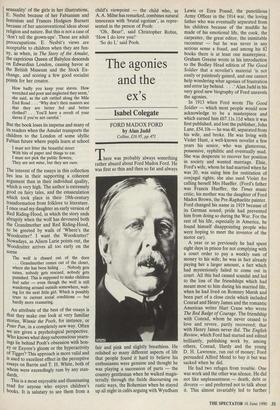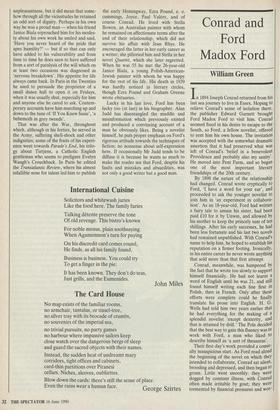The agonies and the ex's
Isabel Colegate
FORD MADOX FORD by Alan Judd Collins, £16.95, pp.471 There was probably always something rather absurd about Ford Madox Ford. He was first so thin and then so fat and always fair and pink and slightly breathless. He relished so many different aspects of life that people found it hard to believe his enthusiasms were genuine and thought he was playing a succession of parts — the country gentleman when he walked magis- terially through the fields discoursing on rustic ways, the Bohemian when he stayed up all night in cafés arguing with Wyndham Lewis or Ezra Pound, the punctilious Army Officer in the 1914 war, the loving father who was eventually separated from his children because of the muddle he made of his emotional life, the cook, the carpenter, the great editor, the inimitable raconteur — but he was never in any serious sense a fraud, and among his 82 books there is at least one masterpiece. Graham Greene wrote in his introduction to the Bodley Head edition of The Good Soldier that a novelist's material 'is not easily or painlessly gained, and one cannot help wondering what agonies of frustration and error lay behind. . . .' Alan Judd in his very good new biography of Ford unravels the agonies.
In 1913 when Ford wrote The Good Soldier — which most people would now acknowledge to be a masterpiece and which earned him £67.11s.11d when it was first published, and lost the publisher, John Lane, £54.10s — he was 40, separated from his wife, and broke. He was living with Violet Hunt, a well-known novelist a few years his senior, who was glamorous, possessive, syphilitic and eventually mad. She was desperate to recover her position in society and wanted marriage. Elsie, Ford's wife, whom he had married when he was 20, was suing him for restitution of conjugal rights; she also sued Violet for calling herself Mrs Hueffer. (Ford's father was Francis Hueffer, the Times music critic; his mother was the daughter of Ford Madox Brown, the Pre-Raphaelite painter. Ford changed his name in 1919 because of its German sound; pride had prevented him from doing so during the War. For the rest of his life, especially in America, he found himself disappointing people who were hoping to meet the inventor of the motor car).
A year or so previously he had spent eight days in prison for not complying with a court order to pay a weekly sum of money to his wife; he was in fact already paying her a larger amount, a fact which had mysteriously failed to come out in court. All this had caused scandal and led to the loss of the friendships which had meant most to him during his married life, when he had lived on Romney Marsh and been part of a close circle which included Conrad and Henry James and the romantic American writer Hart Crane who wrote The Red Badge of Courage. The friendship with Conrad, whom he never ceased to love and revere, partly recovered; that with Henry James never did. The English Review, which Ford had started and edited brilliantly, publishing work by, among others, Conrad, Hardy and the young D. H. Lawrence, ran out of money; Ford persuaded Alfred Mond to buy it but was sacked when he did.
He had two refuges from trouble. One was work and the other was silence. He did not like unpleasantness — death, debt or divorce — and preferred not to talk about it. This almost invariably led to further unpleasantness, but it did mean that some- how through all the vicissitudes he retained an odd sort of dignity. Perhaps in his own way he was a proud man — when his friend Janice Biala reproached him for his modes- ty about his own work he smiled and said, `Have you never heard of the pride that apes humility?' — but if so that can only have added to his vulnerability and from time to time he does seen to have suffered from a sort of paralysis of the will which on at least two occasions was diagnosed as `nervous breakdown'. His appetite for life always came back. In Paris in the Twenties he used to persuade the proprietor of a small dance hall to open it on Fridays, when it was usually shut, especially for him and anyone else he cared to ask. Contem- porary accounts have him marching up and down to the tune of `If You Knew Susie', 'a behemoth in grey tweeds'.
That was after the War, throughout which, although in his forties, he served in the Army, suffering shell-shock and other indignities; some of the fruits of his experi- ence went towards Parade's End, his trilo- gy about Tietjens, a Catholic English gentleman who seems to prefigure Evelyn Waugh's Crouchback. In Paris he edited the Transatlantic Review, where his almost infallible nose for talent led him to publish the early Hemingway, Ezra Pound, e. e. cummings, Joyce, Paul Valery, and of course Conrad. He lived with Stella Bowen, an Australian painter with whom he remained on affectionate terms after the end of their relationship, which did not survive his affair with Jean Rhys. He encouraged the latter in her early career as a writer; she pilloried him and Stella in her novel Quartet, which she later regretted. When he was 55 he met the 26-year-old Janice Biala, a young Polish-American- Jewish painter with whom he was happy for the rest of his life. His death in 1939 was hardly noticed in literary circles, though Ezra Pound and Graham Greene wrote obituaries.
Lucky in his last love, Ford has been lucky too (at last) in his biographer. Alan Judd has disentangled the muddle and misinformation which previously existed and produced a convincing account of a man he obviously likes. Being a novelist himself, he puts proper emphasis on Ford's rigorous attitude towards the techniques of fiction; no nonsense about self-expression here. If occasionally Mr Judd tends to be diffuse it is because he wants so much to make the reader see that Ford, despite his faults and mistakes and absurdities, was not only a good writer but a good man.



















































 Previous page
Previous page